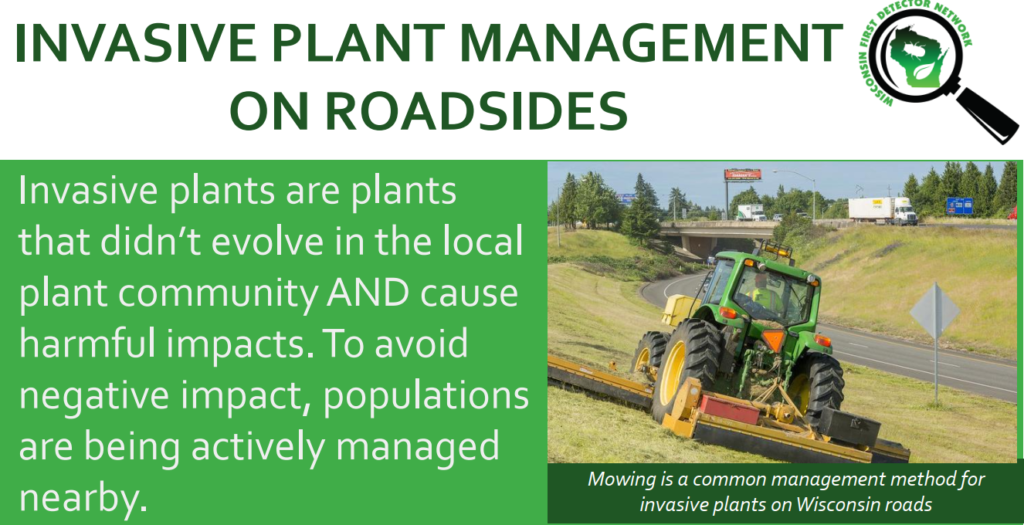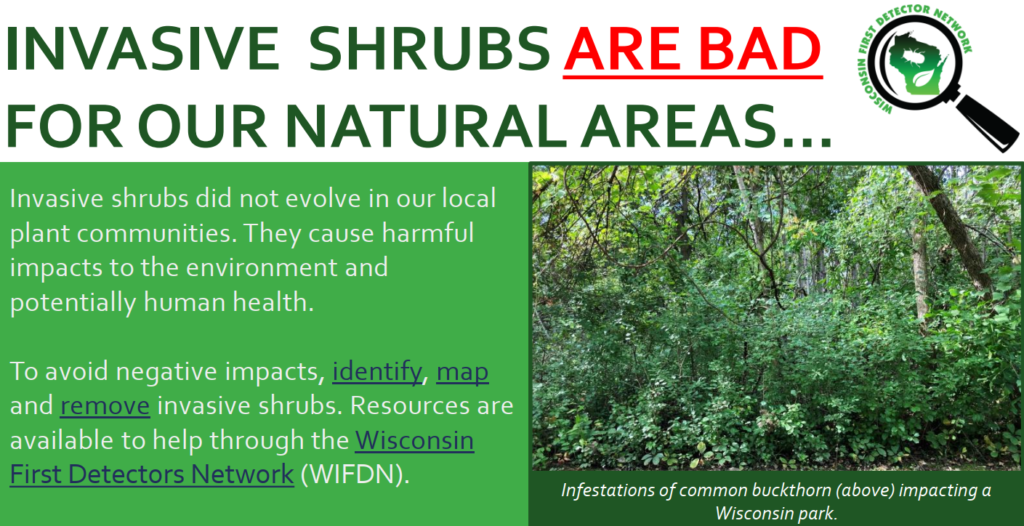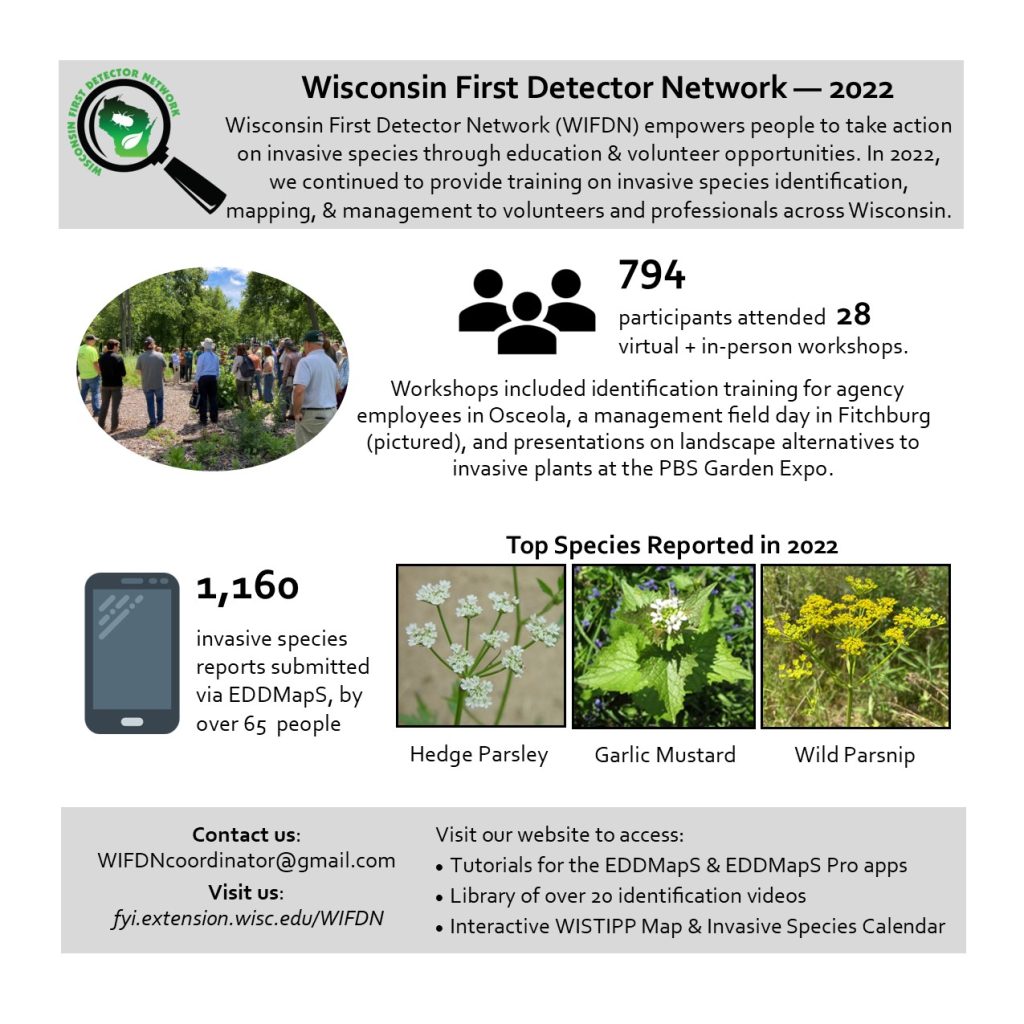Welcome to the Wisconsin First Detector Network!
The Wisconsin First Detector Network (WIFDN) is a community science program that empowers people to take action on invasive species through invasive species monitoring, management, and outreach. WIFDN provides training and resources through a combination of webinars, instructional videos, and hands-on workshops, in addition to providing volunteer opportunities to community scientists.
News
WIFDN Impact and Metrics 2024
With your help, we did some impressive work in 2024. Check out our infographic here.
By the numbers:
- 1,783 participants at 29 events
- Over 4,600 positive invasive species records added, and over 13,000 negative reports submitted
- 2,781 hours dedicated by volunteers to invasive species surveying, management, and outreach
- 6,358 mile traveled to volunteer activities
We couldn’t do this work statewide without our awesome volunteer network, so thanks again!
Invasive Species Clearinghouse for Early Detection in Wisconsin
We have worked with fellow species experts to bring together a focused short list of 2025 priorities species for early detection in Wisconsin. Visit our sister site, Renz Weed Science, to find our clearinghouse of species across taxa to include terrestrial and aquatic plants, insects, animals, and diseases.
Thanks to Mark Renz, Matt Wallrath and John Zaborsky (terrestrial plants, contact: mrwallrath@wisc.edu), Paul Skawinski (aquatic plants, pskawins@uwsp.edu), PJ Liesch (insects, pliesch@wisc.edu), and Brian Hudelson (diseases, hudelson@wisc.edu) for consulting on species and adding links from their work.
New slides as a resource for invasive species ID
Check out these plant identification content slides, searchable by species!
Thanks to our staff instructor John Zaborsky for creating this for the Renz Lab as a way to engage students with invasive species issues.
Factsheets to share for right of way managers, park and natural area stewards
We are excited to share out 1 page factsheets to increase awareness of the importance of invasive species work. We have created a factsheet focused on management in rights of way and one that explains why invasive control is a priority in parks and natural areas. Click on the pictures below to download a PDF, so please share widely! We suggest printing them out for volunteer training days and posting them in offices where roadsides and utilities are managed, as well as sharing them digitally with colleagues and community members.


UPDATE: Record Your 2023 Volunteer Efforts!
Every year, people connected with WIFDN spend an incredible amount of time and energy working on invasive species monitoring, management, and outreach across the state. Over the past 6 years, you’ve reported over 17,000 hours, which equates to over $450,000 of efforts!
So now it’s time to share what you did in 2023! Please take 2 minutes to fill out our short survey that will ask you approximately how many hours you spent on invasive species efforts and how far you traveled. Whether you’ve done work on your own property or for a local park, whether you volunteer with another group or just on your own, we’d love to hear from you!
Thanks for taking the survey!
Change of leadership at WIFDN
In 2023, our program coordinator job changed hands. We would like to thank Anne Pearce for her many years of strong service, training, and the amazing digital resources she created. Outreach Specialist Matt Wallrath is now at the helm, providing the state with an engaging education style and sharing his decades of experience in fieldwork, science, and policy around invasive species. Contact him at mrwallrath@wisc.edu.
WIFDN’s 2022 Summary

Upcoming Events
Learn more about WIFDN
Invasive species are considered to be the number two threat to biodiversity, second only to habitat loss. The effects of invasive species are increasingly evident on Wisconsin’s landscape. Despite efforts by federal and state agencies, non-native insects, plants and diseases continue to establish and spread throughout our state, impacting our economy and environment. While some of these pests are here to stay, many others have not yet been found in Wisconsin, and still more are found at low enough levels that eradication may be possible. Efforts to prevent new introductions and to identify new infestations before they become well established are the best way to ensure the survival of many of Wisconsin’s iconic plants, animals, and ecosystems.
By joining Wisconsin First Detector Network, you will have access to online training resources brought to you by invasive species experts from across the state. Training topics include terrestrial and aquatic invasive species biology, identification, and reporting. We emphasize species of concern to Wisconsin (e.g. emerald ash borer, spotted lanternfly, giant hogweed), but we also discuss general resources for other species. We invite participants who are already doing invasive species volunteer work in Wisconsin, as well as people who are looking for new volunteer opportunities. Consider becoming a First Detector and help improve our network and minimize the impact and spread of invasive species in Wisconsin!
For more information
Matthew Wallrath, WIFDN Coordinator
WIFDNcoordinator@gmail.com
608-262-9570
1575 Linden Drive
Madison, WI 53706




